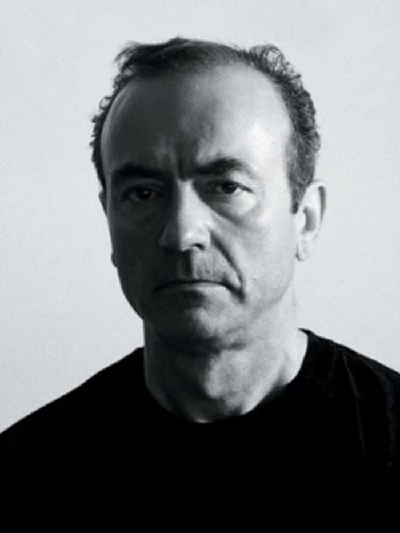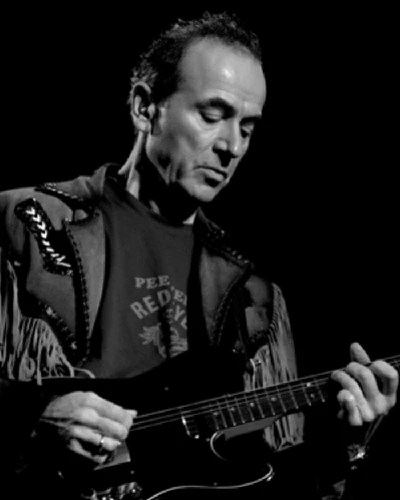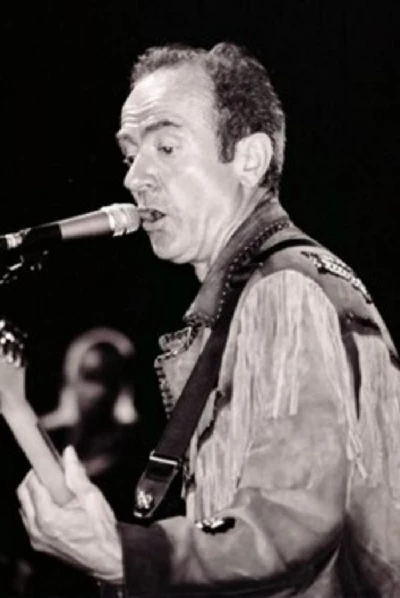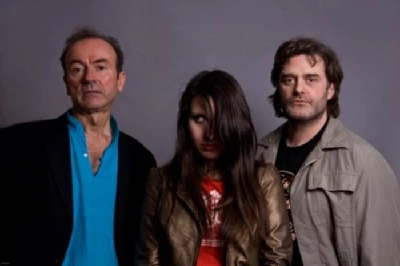published: 20 /
6 /
2008

Former Stranglers front man Hugh Cornwell has just released his seventh solo album, 'Hoover Dam', which is initially available as a free download, and an accompanying cinema film, 'Blueprint'. John Clarkson speaks to him about both the new album and the film
Article
Hugh Cornwell has been a consistent presence on the British music scene for over thirty years. As the original front man and main songwriter with the Stranglers he met with enormous success, having ten hit albums and twenty-one top 40 singles during his seventeen years at the helm of his band. Since he left the Stranglers in August 1990 the day after they played a sell-out show at Alexandra Palace in London, Cornwall has carved out a prolific solo career, and has also published two books, ‘The Stranglers : Song by Song’ (2001), and his autobiography, ‘A Multitude of Sins’ (2004).
Cornwell’s seventh and latest solo album, ‘Hoover Dam’ takes its name from the massive hydroelectric power station and concrete dam that is built on the border of Arizona and Nevada. A more garage rock-orientated and sometimes psychobilly-influenced album than Cornwell’s previous offerings, ‘Hoover Dam’ was produced by Liam Watson, who is best known for his work on the White Stripes’ ‘Elephant’, and also features Cornwell's current band of Caroline Cunningham on bass and Chris Bell on drums. It was recorded in East London at Watson’s Toe Rag Studios, which is an eight-track analogue studio largely equipped with gear from the 1940s and 1950s.
In a brave move, Cornwell has made all of ‘Hoover Dam’ initially available as a completely free download from www.hooverdamdownload.com. A physical version of the album will go on sale shortly, and will also include an hour long documentary, ‘Blueprint’, which features a live performance of all the album filmed at Toe Rag, and an interview which took place with broadcaster and journalist Robert Elms and that was filmed at the Tate Gallery. In June Cornwell presented ‘Blueprint’ in thirteen cinemas in the independent chain Picturehouse, taking questions afterward at each event .
In what is his second interview with us, Hugh Cornwell spoke to Pennyblackmusic about ‘Hoover Dam’ and the new film.
PB : Why did you decide to call the new album ‘Hoover Dam’. What is the appeal to you of the original Hoover Dam in the United States ?
HC : I just liked the ethic involved with it. I think that it is the most remarkable engineering feat that the human being has ever created. It is totally inspiring
PB : To call an album that then gives it an immediate monumental quality then , doesn’t it ?
HC : Yeah, that’s right. Obviously one inspires to certain things and one wants to create great pieces of work. I had no idea what I was embarking on with Liam Watson until I got into the studio with him, but once I was there I discovered some really weird parallels between Toe Rag and the Hoover Dam.
I started watching a lot of old footage of the construction of the Hoover Dam, because I thought if I am going to call an album after that I better do my homework and know as much about it as possible. I watched some amazing old films of its construction and which showed the equipment that does the power generation. It was up-dated in the 90’s, but basically it is the same equipment which was there in the 30’s and that equipment was very like the equipment in Toe Rag (Laughs).
A lot of the Toe Rag equipment is in this pressed steel plate painted grey with black writing on it, and has very, very big knobs like in the old science fiction films. I asked Liam about that after I had seen this footage, and he told me that the reason for that was all that technology was created at the same time and the designs were pretty much the same for everything in those days. His equipment in Toe Rag is a little more recent than that on the Hoover Dam and was built in the late 50’s, but between that period between the 30’s and 50’s technological design had a certain uniformity to it. When I saw that footage having just finished doing the album at Toerag, it was a very odd experience (Laughs).
PB : Were you aware of Liam Watson’s reputation beforehand ?
HC : I knew of his association with the White Stripes and on ‘Elephant’, but I hadn’t studied it in any real depth because I hadn’t ever conceived that I might ever work with him. It was my manager who suggested him. We then met up and got on very well and it just went from there ..
PB : Was it a quick album to record ?
HC : It was actually. We earmarked three weeks for recording and a week for mixing. It took two and a half weeks to record and we had a couple of days off at the end, so rather than waste the time we got in a film crew to do the ‘Blueprint’ film. They filmed us playing through all the songs live and then recorded it live, straight down onto two track, warts and all, no overdubs or anything.
While we had a week earmarked for the mixing, it in fact took longer to mix that recording than it has ever taken for me to do anything that I have ever worked on. It took Liam three months to mix it, working on it not every day, but two, three, four days a week and then the rest of time he would work on something else. He knew what it wanted to sound like and because Toe Rag is only an eight track studio he could do a mix of a song in half a day. So he would do them, take them away and listen to them, then go back and do some of them again as if they were sketches and with each sketch becoming more and more refined until he found the right one.
He wouldn’t let me go in when he was mixing. It is a very personal thing with him. He doesn’t like to be overlooked and so I left him to it and three months later at the beginning of April (Laughs) he finally rang me and said, “I think it is done now.”
PB : Are you happy with the results ?
HC : Yes, definitely. He probably had a dozen mixes of each song but I didn’t listen to those. He just sent the ones that he was pleased with.
PB : ‘Hoover Dam’ has come out first of all as a free download. The actual physical version of the album will come out later. Why have you made it available first of all on download first of all, and why have you decided to make it free ?
HC : The idea of making it a download just seemed to be the way to go. The internet is the most perfect delivery system that has ever been devised for music. I have been in record shops recently and there is no one in them. They are deserted. People are getting both busier and lazier, and they don’t have the time to do the things they used to, so if you can facilitate their access to what you do that can only be an advantage.
As far as being free goes, it is a gamble. When you download something you don’t quite get the quality that you get from a manufactured CD. You get about ninety percent of the band width. You’re not quite getting the genuine article, but it is good enough for people to listen to, get used to and decide whether they like it or not. I would rather have people decide if they like it and then decide whether or not they are going to buy it, rather than not even having heard it then decide not to buy it.
When you buy clothes off the rack, you try them on first, so why should you buy CDs totally on spec ? It costs too much money these days. If CDs were one or two pounds each, then I would be selling into that from the outset, but with the recession coming on I like to think that I am like a breath of fresh air (Laughs). People can get my album free and then maybe buy it if they want it.
That’s one of the reasons why we did the film. I said, “Look ! If we’re going to do this download we’ve got to give them something extra if they buy the CD”, and so that is how ‘Blueprint’ was born.
Originally Invisible Hands, my record label, wanted a film of the making of the album, but I didn’t want that because I thought it would be a distraction to have cameras over our shoulder while we were working. I thought it would have an intrusive and destructive effect on it, so that’s how the idea of performing the record came about. The record company then said, “Let’s have an interview as well.” Making ‘Blueprint’ was a very organic process, so much so that there is no director credit on the record. No one directed it.
PB : You are, however, credited as edit director.
HC : Yeah, I directed the edit. I spent four weeks doing that and I think that was a pretty accurate description of my role. No one can put up their hand and say they directed it because it wasn’t directed. The cameramen took the cameras in and filmed it and we ended up with the footage (Laughs). There was no grand plan from the word go of what we were going to do. It was a bit haphazard, but hopefully we have come up with something that is interesting enough to warrant people wanting it.
PB : You have been very open about acknowledging the influence of late 60’s films like Jean Luc Godard’s ‘Sympathy for the Devil’ and Norman Jewison’s ‘The Thomas Crowne Affair’ when you edited it and in and their use of multi imaging and split screening. What was the appeal to you of those films ?
HC : I am a huge movie fanatic. It is my greatest love other than music. I had as much fun doing the edit for this film as I did making the record because I enjoy films so much. I had never done anything like before whereas I have made loads of albums (Laughs).
With regard to those films in particular, I just didn’t want to make another DVD with the same old camera angles and which, like so many music DVDS, after ten minutes you’re bored and want to know what is on the other channel. I wanted to do something that takes you on a journey through the record.
PB : You shot the live footage in Toe Rag which is situated in a pretty rundown part of East London and then the interview in contrast in the rather more lush surroundings of the Tate Gallery. Was that deliberate planning to make the two locations of the film so contrasting ?
HC : It is a complete contrast (Laughs), but no. I always thought the Tate Gallery would validate an interview. It would give it a certain gravitas and would affect the interview and the way in which it was held and both the answers I gave and the way in which the questions were given. I didn’t see a list of questions upfront. It was totally filmed ad lib and when you have got a situation like that then the environment that you do it in is very, very important. I just thought that the Tate would make a great location for it.
PB : You talk at the beginning of the film about how you have now been out of the Stranglers as long as the seventeen years that you were in them. You said that that was a real emotional turning point and also imply in the film that you saw your time in the Stranglers as an apprenticeship. What status do you see yourself as now in with regard to making music ?
HC : The kindest remark I can say is probably as a mature artist. The whole time I was in the Stranglers - and I haven’t said this before to anybody because no one has ever asked me this - I was never quite sure if we were going to be able to produce another album. I was always unsure if there was going to be enough material to make another record. I don’t lose any sleep now about the next record at all. Writing is like falling off a log now. I have in fact already started working on the next album. I haven’t done it consciously. Ideas have just started presenting themselves.
PB : Do you think that is just a confidence thing ?
HC : I think that a lot if it is. You’ve also got to be in the right environment. It has taken me a long time and after being solo all these years to create an environment for myself where I feel comfortable and confident when I am writing songs and where I am come up with all the goods.
PB : A lot of the titles of the album, such ‘Delightful Nightmare’ and ‘Rain on the River’ rely a lot on wordplay. Was that a conscious decision ?
HC : It is one of those things that turns me on.
PB : ‘Delightful Nightmare’ in particular is a really intriguing name. How can you have a nightmare which is delightful ? Are you suggesting that sometimes the most awful experiences are the most character-developing and the ones which can sometimes push us into something better than that which we already had ?
HC : There you go. It has made you think about it which is good. That is all I wanted to do with that title.
PB : ‘Rain on the River’ was another wordplay. It tells about the death from an overdose of the actor River Phoenix outside the Viper Room in Los Angeles and his sister Rain who was with him at the time, You got the inspiration for that after being invited, because before you became a musician you worked as a biochemist, to make a pilot documentary for a proposed series about the premature deaths of various rock and film stars. Was that film ever shown ?
HC : I don’t think it was ever made. There are so many satellite channels now that it could have possibly been screened on one of those, but no one has ever told me about it if that is the case. Maybe it has. Maybe it hasn’t. I honestly don’t know.
PB : ‘Philip K. Ridiculous’ is about the author, Philip K. Dick. Why did you decide to make an instrumental track, the one instrumental track in fact, on the album about a man of words ?
HC : I did an instrumental track, ‘Mothra’, on an album called ‘Nosferatu’ I did in collaboration with Robert Williams in 1979. I have been playing that track pretty consistently throughout the last fifteen years of my live set and I love playing it. Whatever line-up I have ,we all love playing it because it is a real mind game of a track. A lot of the time we start rehearsals off with it as well because it is very good at getting the systems again. Ever since because I am so fond of that track I have been wanting to write something not similar, but in the same vein, another instrumental with weird timing on it, and it just presented itself this time.
PB : A lot of Philip K. Dick’s writing has got some very odd sentence structures and is fairly abstract in tone. Does it tie in with that too ?
HC : Yes, exactly. It seems to fit with that too.
PB : The last track on the album, ‘Banging on the Same Old Beat’, it is about musicians who get back together and go back on the road playing the same songs that they have always done. Right at the end of the film you throw yourself into that category as well. A lot of your fans will be quite surprised about that as you have always made a point of trying to do something different with each new solo album.
HC : At the moment I am doing 50% old Stranglers songs and 50% of my own materials in my live shows . That is what I meant by it. To a certain extent I am. I don’t mind being thrown into that category too.
PB. You have published ‘The Stranglers : Song by Song’ book and your autobiography, ‘A Multitude of Sins’. You had a short story published a while ago. Do you have plans to do any more prose writing ?
HC : The short story wasn’t published. I was commissioned to read on it for air for Radio Four, so I narrated it, but it wasn’t actually published. I have been working on a novel, which I am in the process of finishing off, and which I have being shown to some publishers.
PB : Are you prepared to say what that is about at this stage ?
HC : No, there is no point. If it gets published people will know about it then . I am very pleased with it. We’ll see what happens.
PB : You have recently done a cinema tour of thirteen dates with questions and answer sessions afterwards to promote ‘Blueprint’ and you’re now planning to do another one of those in the Autumn. Yet you’re not going to be doing a full tour to promote ‘Hoover Dam until next year. Why have you decide to hold on that ?
HC : Partially because the film is doing so well in cinemas. Why rehearse and go out on tour when there is the movie and it’s doing a great job ? I’d like to let that grow. It will just confuse people if I got out at this point, and start doing live shows as well
The other reason is that for the last few years I have gone out to tour at exactly the same time as the Stranglers and I am not going to do that this time. In fact this time they are doing something which is perfect for me. They’re going out and doing a Greatest Hits tour this October/November which I want everyone to go to because I will get some of the publishing money for that. I see that as a tribute to the time I was with them, so I couldn’t ask them to go out and do a better tour as a prelude to me going out with my new album in February.
PB : What are you plans for the future ? Is the next stage once you have promoted this record and the film just to carry on working on the next album ?
HC : Yeah, I get bored very easily, so I like to be busy. If I get time off from music then I will write prose, and if I don’t get time off I will be playing music and doing shows. To me life is work. Those two four letter words are synonymous to me at the moment.
PB : You seem to be as enthusiastic and as excited as ever.
HC : Yeah. As you get older, it gets more difficult to get the body to do all the things you need it to do, because playing music is such a physical thing. I have to spend a lot of time making sure that I am healthy enough to take on that workload but I feel very fortunate to be able to do what I do. I really can’t think of a better job.
PB : Thank you.
Band Links:-
http://www.hughcornwell.com
https://www.facebook.com/hughcornwello
https://twitter.com/HughCornwell
Have a Listen:-
Picture Gallery:-



Visitor Comments:-
|
|
140 Posted By: aidan griffin, banna east, ardfert, co kerry ireland on 10 Oct 2008 |
hi,
what a great interview, frank and honest, from a very intelligent and gifted man, i am from south west ireland, banna east, just outside trallee co. kerry.
i just got his new cd/dvd, its brilliant. the stranglers were never the same when hugh left, in fact his solo work is much stronger, than when he was a strangler. he had a very bad heroin problem back then, and its great that the man is alive and healthy today, performing and making great music and long make it continue.
i am looking forward to seeing him next march in dublin.
great interveiw.
thanks,
aidan griffin
|